
North Dakota Indoor Shows Requiring Vaccine Or Negative COVID Test
This is just a hypothetical for now, but something tells me we could be headed in this direction very fast. A story out of Minneapolis just came out stating that First Avenue in Minneapolis is going to require proof of vaccine or negative COVID test. This policy goes into effect immediately. This was according to Bring Me Minnesota The News.
First Avenue first alerted its fans on their Facebook Page yesterday of their intentions. As you might of guessed, it came with some scrutiny. Here's that post.
If you take the time to read some of those comments, you can see it went over like a fart in church, but others went on to defend the clubs decision. One point that was made, if you don't want to get the vaccine, just don't go to the show sick. Get a negative test to prove you are healthy.
The question that remains to be seen, will other venues move in this direction? Live Nation was rumored to be heading in this direction earlier this year. So far, they haven't but I can see them doing so.
We're seeing other examples of businesses going in this direction all over the country. Restaurants, night clubs and other types of businesses are requiring proof of vaccine or a negative COVID-19 test.
We've all seen what's happening with the National Football League. They are requiring their coaches to be vaccinated. However, players at this time have not been forced into getting the shot. The Minnesota Vikings have a big controversy with their quarterbacks, who are now in COVID protocol after a positive test with one of their players.
The writing is on the wall. Nobody wants to go back to the way it was and the shutdowns. Businesses are about making money, and they are going to do what they feel necessary to conduct business and be profitable. That may require proof of vaccine or a negative test. It could even happen at the job you work at? Don't believe it, look no further than Sanford in Bismarck. Time to come to grips with all of this.
My Favorite NDSF Concerts
See How School Cafeteria Meals Have Changed Over the Past 100 Years
More From Cool 98.7 FM









